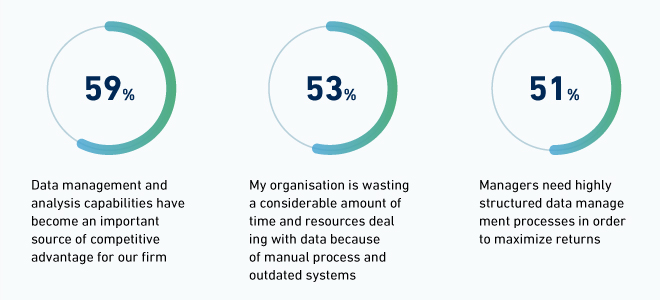Insights
Maximizing Private Markets Returns Through Data Management

Our 2023 Future of Private Markets Study highlights key challenges faced by asset managers and owners.
March 2023
Higher borrowing costs and rising compliance burdens are causing asset managers and owners to address operational inefficiencies to help increase their margins and maximize their returns. While data is now accepted as core to delivering improved efficiency, our recent study suggests that asset managers and owners continue to face considerable challenges to effectively harness the potential of data.
According to our study, about 61 percent of traditional asset managers and 53 percent of asset owners said that data transparency is a key issue when making investments in private markets. Meanwhile, data management inefficiencies are a top operational concern for about one-third of private markets-focused asset managers, asset owners and insurers.
Ineffective data management
Asset managers and owners consider ineffective data management to be one of the biggest challenges when evaluating their investments in private markets.

Fewer than four in 10 survey respondents said that they have advanced data management and reporting functions. While some institutions are marginally better developed in certain areas, sophistication in data management is scarce. Asset owners report having greater confidence in collating and efficiently processing data, but lack the confidence to maximize its potential. Meanwhile, insurers say that quantifying ESG risk exposure is an area of weakness for them.
Different priorities
Considering their diverse responsibilities and roles in the private markets sector, asset owners and managers have different data management and reporting priorities. For traditional asset managers, maximizing the potential of data to make more effective decisions is a key aspect of their strategy. On the other hand, asset managers focus more on ingesting and efficiently processing data, and providing it to relevant teams.
While making effective decisions is a top priority for asset owners and managers alike, it is also crucial for them to maximize the potential of data and integrate new systems and analytical tools with their existing technology.
Divergent approaches
Asset managers and owners take different approaches when confronting the data management challenge and improving data analytics to reduce opacity in private markets. Our study found that traditional asset managers are more likely to build their in-house systems, in contrast to private markets-focused asset managers who prefer using technology from third-party data conventions, such as International Organization for Standardization (ISO) or Financial Industry Business Ontology (FIBO). Meanwhile, asset owners are more likely to take a balanced approach, combining third-party provider technology with in-house systems.
Advanced analytical tools and a more sophisticated data management process can help give asset managers and owners a greater edge in private markets and maximize returns for clients and investors, along with providing insights for improved risk management.
